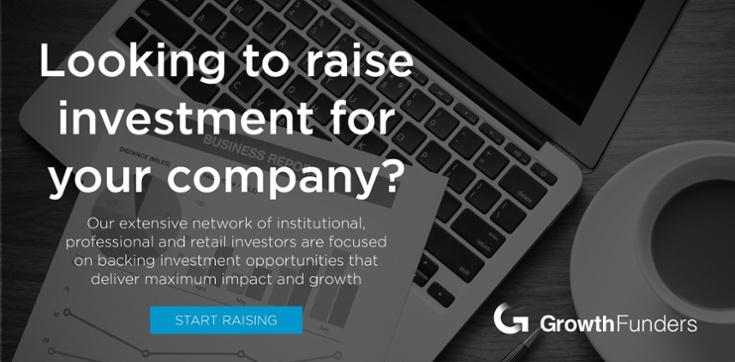Raising money for your startup Step 1: Create a great elevator pitch.
Pitching for investment can happen in many ways...
...for example, you can pitch face-to-face in a live setting, online, via an equity crowdfunding platform, or on paper with your investor presentation and executive summary. With an online co-investment platform, like GrowthFunders, you could be given the opportunity to do all three as part of your fundraising campaign.
In each of these three situations, the way you introduce yourself can be one of the most important parts of your pitch, as it’s the first opportunity you get to make your business stand out. If you can explain what your business does in a clear, creative, and concise way, without using jargon, and in less than 30 seconds, then you’re off to a strong start.
The best way to do this is with an elevator pitch. We'll look at some tips for delivering great elevator pitches as well as some fantastic examples in a bit. The great thing about an elevator pitch is that it can be reversioned depending on the type of pitch you're delivering.
For example, the face-to-face pitch: the sub-30 second approach mentioned above, written: a single sentence to a paragraph, online: your pitch video is the perfect way to introduce potential investors to your business and show them what it's all about.
This post will focus on elevator pitches for face-to-face and live pitching opportunities. Depending on the set-up, the potential investors in your audience may have a number of pitches to view on the same day and will watch one after the other.
Although they will most likely be taking notes and will have your supporting documentation (usually in the form of your executive summary), it’s better if they can remember your business in one simple sentence.
Time restraints
Each pitching opportunity comes with its own guidelines, which you should be aware of, prior to delivering your investment pitch. One of the most important things you will need to know before you pitch is how long you have.
This can be as different as 5 minutes or 30 minutes, but as long as you have your core presentation ready, you can edit or enhance, depending on the time restraints given.
The wrong way to introduce your business
It’s not the time or place to tell your life story; right now, they don’t need to know about the paper round you had at the age of 11. At this point, if it’s not relevant to your business, leave it out. It takes up too much of the (limited) time you have to pitch.
The right way to introduce your business
A well-written elevator pitch is the key to the delivery of a successful investment pitch. If you don’t know how to write one, worry not – below, you’ll find some top tips to writing the perfect elevator pitch.
1. Twelve Tips for a Winning Elevator Pitch
Nicole Fallon, Business News Daily Assistant Editor
This article gives some great tips for writing and delivering a great elevator pitch from a number of entrepreneurs and business professionals:
“Start off strong. "Eighty percent of your success will depend on your opening line. It must snag your listener's interest and make them want to know more. Do this right, and your prospects will follow you, wanting more." – Bert Martinez, founder and president of Bert Martinez Communications [8 Essential Questions Your Elevator Pitch Should Answer].”
2. Mad Libs For Pitches: How To Perfect The One Sentence Pitch
Evelyn Rusli
“When it comes to the one sentence pitch, [Founder Institute founder, Adeo] Ressi says “Most entrepreneurs manage to screw it up… How much better would the world be if every startup could explain their business well in one sentence?”
To help entrepreneurs perfect the art of the micro pitch, he’s created a rudimentary template in Mad Libs style:
My company, ___, is developing ___ (a defined offering) to help ___ (a defined audience) solve a problem with ___ (?)"
3. Elevator Pitch Essentials
Chris O'Leary
Chris' essay tells you everything you need to know about elevator pitches, from a high-level explanation and down to some nitty-gritty details. Here are his "Nine C's of an effective elevator pitch":
- Concise
- Clear
- Compelling
- Credible
- Conceptual
- Concrete
- Customized
- Consistent
- Conversational
4. Create the perfect elevator pitch to an Angel Investor
Venture Giant
This article encourages you to ask yourself some questions as you write your elevator pitch, including "Is the elevator pitch designed with a specific outcome in mind?" and "What is your desired outcome". The idea is that these questions will help you to focus your introductory pitch and make sure it does its job correctly.
5. Give the perfect elevator pitch
Kevin Daum, Inc. 500 entrepreneur
This post suggests three steps to elevator pitch success: Connecting with Empathy, Offering an Objective Solution, and Providing Differentiation as “you have about 1--2 minutes to leave an impression powerful enough to get someone to continue the conversation after exiting”. The aim is to tease your audience and leave them wanting more.
6. Eight mistakes entrepreneurs when pitching to investors
Martin Zwilling
Whilst this article talks about a whole presentation, #1 - "The elevator pitch is longer than one minute" is good as it explains why this part of the introduction benefits from being brief: "If your 'elevator pitch' is longer than one minute, you will have a very difficult time raising money because you will not have enough time to make a compelling investment case."
Bonus: Listen to startups give elevator pitches to a top VC – in elevators.
This fantastic post gives you the opportunity to listen to some actual examples of elevator pitches as delivered to Albert Wenger of New York VC firm Union Square Ventures.
We'd love to know which elevator pitches from the Bonus article stood out most to you and why. Let us know your thoughts by leaving a comment below.
%20(3)%20(2).jpg)








